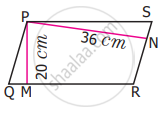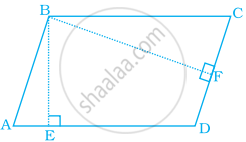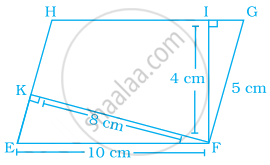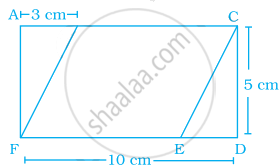Advertisements
Advertisements
प्रश्न
Find the missing values.
| Base | Height | Area |
| 18 cm | 5 cm |
उत्तर
Given: Base 6 = 18 cm
Height h = 5 cm
Area of the parallelogram = b × h sq.units
= 18 × 5 cm2
= 90 cm2
Tabulating the results, we get
| Base | Height | Area |
| 18 cm | 5 cm | 90 cm2 |
APPEARS IN
संबंधित प्रश्न
PQRS is a parallelogram (see the given figure). QM is the height from Q to SR and QN is the height from Q to PS. If SR = 12 cm and QM = 7.6 cm. Find:
- the area of the parallelogram PQRS
- QN, if PS = 8 cm

If area of a parallelogram is 29.6 sq cm and its base is 8 cm, find its height.
Janaki has a piece of fabric in the shape of a parallelogram. Its height is 12 m and its base is 18 m. She cuts the fabric into four equal parallelograms by cutting the parallel sides through its mid-points. Find the area of each new parallelogram
In a parallelogram the base is three times its height. If the height is 8 cm then the area is
In a parallelogram PQRS (See the diagram) PM and PN are the heights corresponding to the sides QR and RS respectively. If the area of the parallelogram is 900 sq.cm and the length of PM and PN are 20 cm and 36 cm respectively, find the length of the sides QR and SR
Area of parallelogram ABCD (see the figure) is not equal to ______.

In the given figure, EFGH is a parallelogram, altitudes FK and FI are 8 cm and 4 cm respectively. If EF = 10 cm, then area of EFGH is ______.

If the sides of a parallelogram are increased to twice its original lengths, how much will the perimeter of the new parallelogram?
In the given figure, area of parallelogram BCEF is ________ cm2 where ACDF is a rectangle.

ABCD is a parallelogram in which AE is perpendicular to CD as shown in the given figure. Also, AC = 5 cm, DE = 4 cm and area of ΔAED = 6 cm2. Find the perimeter and area of parallelogram ABCD.
